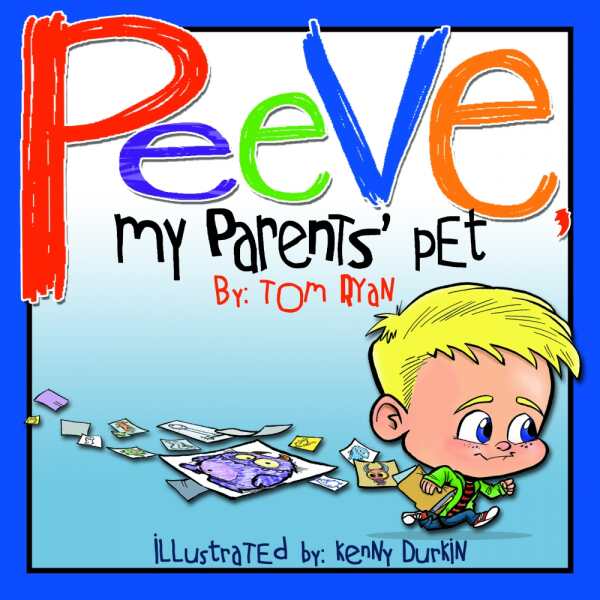Peeve, My Parents' Pet
A child’s funny misinterpretation of words is both enjoyable and humorously lifelike.
Distraught parents can say the darndest things, and young ears and minds may often have trouble understanding their adult expressions of frustrations. In Peeve, My Parents’ Pet, author Tom Ryan centers on one common expression to spin a clever and imaginative tale about a young boy’s search for a mysterious animal: his parents’ pet, Peeve.
Every time the boy is caught misbehaving (e.g. leaving sticky fingerprints on the piano, cookies in the dryer, or asparagus in the fireplace), his parents exclaim, “That is my pet peeve.”
Thanks to delightful illustrations by Kenny Durkin that rival any televised cartoon, readers watch the unnamed boy search high and low for this elusive pet. But the boy cannot find this mysterious animal anywhere. There’s even a whimsical two-page spread in which the boy tries to draw what he think this animal—who only shows up when the boy is in trouble—looks like. Does he have a goofy grin and horns? Perhaps a floppy tongue and a spiky tail?
The boy, as cunning and cute as Dennis the Menace, finally concludes on the last page of the book: “I’ve been wanting to ask my parents for a dog. But until they can do a better job controlling their pet Peeve, I think we’d better wait.”
Parents will commiserate with the comically distressed parents who wearily eye the pasta thrown on the restaurant wall by their son. Likewise, young readers will delight in the boy’s look of innocence and bewilderment as he searches for “Peeve” every time he is caught doing something naughty. Slightly older young readers may grasp the clever take on the misunderstanding of words, although this level of understanding of word play is not necessary to enjoy the simple picture book.
In the end, Peeve, My Parents’ Pet works well on many levels, whether it is parents sympathizing with other parents, young kids watching the protagonist search for a mysterious and naughty animal, or older readers finding humor in the funny misinterpretation of a common phrase.
Reviewed by
Amanda McCorquodale
Disclosure: This article is not an endorsement, but a review. The publisher of this book provided free copies of the book and paid a small fee to have their book reviewed by a professional reviewer. Foreword Reviews and Clarion Reviews make no guarantee that the publisher will receive a positive review. Foreword Magazine, Inc. is disclosing this in accordance with the Federal Trade Commission’s 16 CFR, Part 255.

